All 64 of the countries where it’s illegal to be LGBTQ+ – and yes, it’s all colonialism’s fault
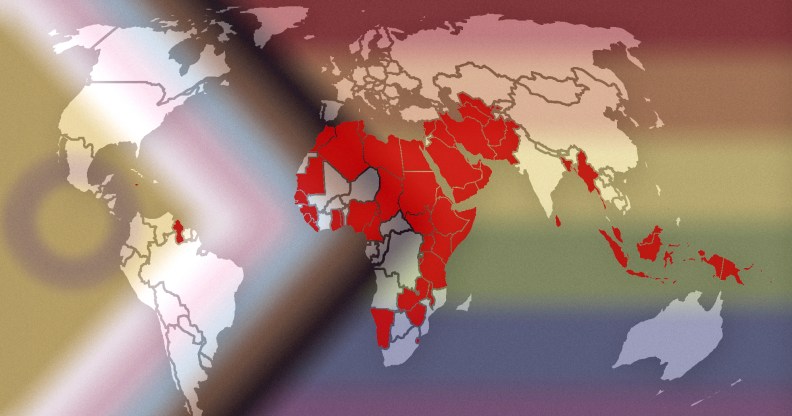
According to the Human Dignity Trust, 68 countries and territories around the world still criminalise LGBTQ+ people. (PinkNews)
How many countries is it still illegal to be gay in 2024? More than you’d think, probably.
But first, some good news. A lot has changed over the last few decades when it comes to LGBTQ+ rights.
Many queer people now have the option of marrying their partners, while trans people in some parts of the world can legally change their gender.
Progress should be celebrated, but it’s too easy to forget that in the background, countless LGBTQ+ people are living under harsh regimes in which their very existence is criminal.
According to the Human Dignity Trust, in response to the question “how many countries is it illegal to be gay”, they set out 64 jurisdictions where LGBTQ+ activity is criminalised.
Trans people also face criminalisation under laws that ban “crossdressing”, “impersonation” and “disguise”. Many gender diverse people are also targeted under laws that ban same-sex sexual activity.
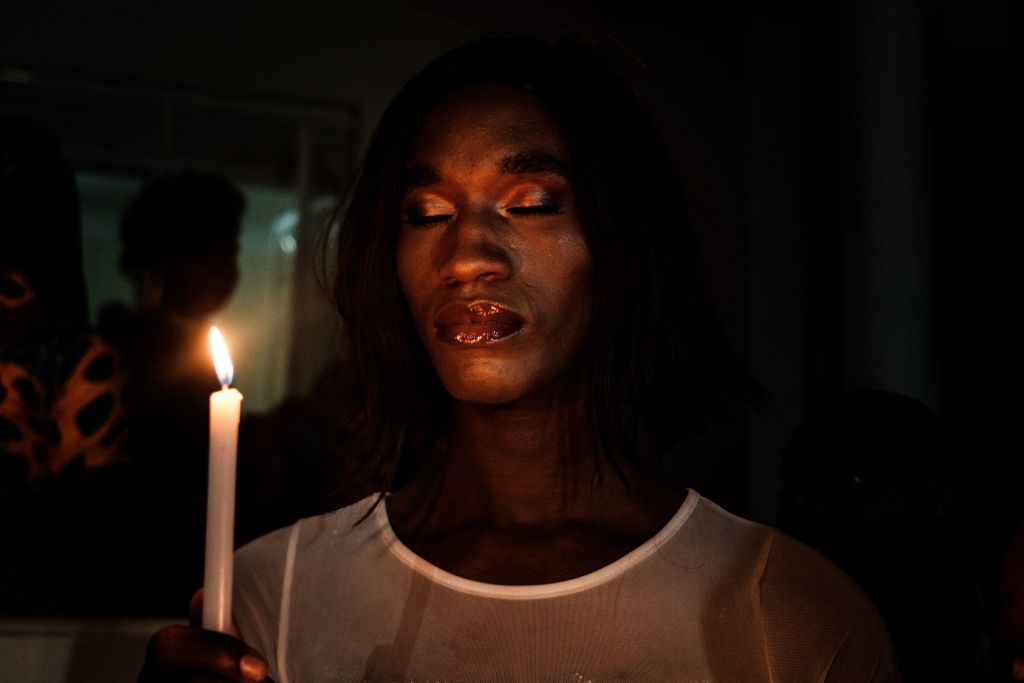
It’s also vital that we place those laws within the right context. Colonialism – specifically British colonialism – is inseparable from the scourge of anti-LGBTQ+ laws. The British Empire was instrumental in spreading legislative homophobia all across the world, and queer people in former colonies are still dealing with the fallout to this day.
Britain and other colonising forces played an instrumental role in spreading homophobia
Alistair Stewart, head of advocacy at the Human Dignity Trust, tells PinkNews that such laws have their roots in religious laws first implemented in Europe, which later became secular legal codes.
“During the colonial era European powers exported these legal systems, and the laws criminalising LGBT people, across the globe, imposing them at times over diverse indigenous traditions where same-sex activity and gender diversity was not necessarily taboo,” Stewart says.
“The clearest example of this is in the Commonwealth where the majority of the 33 Commonwealth countries that criminalise same-sex activity do so on the basis of laws that stem from the colonial era and have remained unchanged for 50 or 100 years.
“The legacy of specifically British colonial-era penal codes figures heavily in the story of criminalisation – more than half of countries which criminalise LGBT people today can trace the source of these laws to Britain.
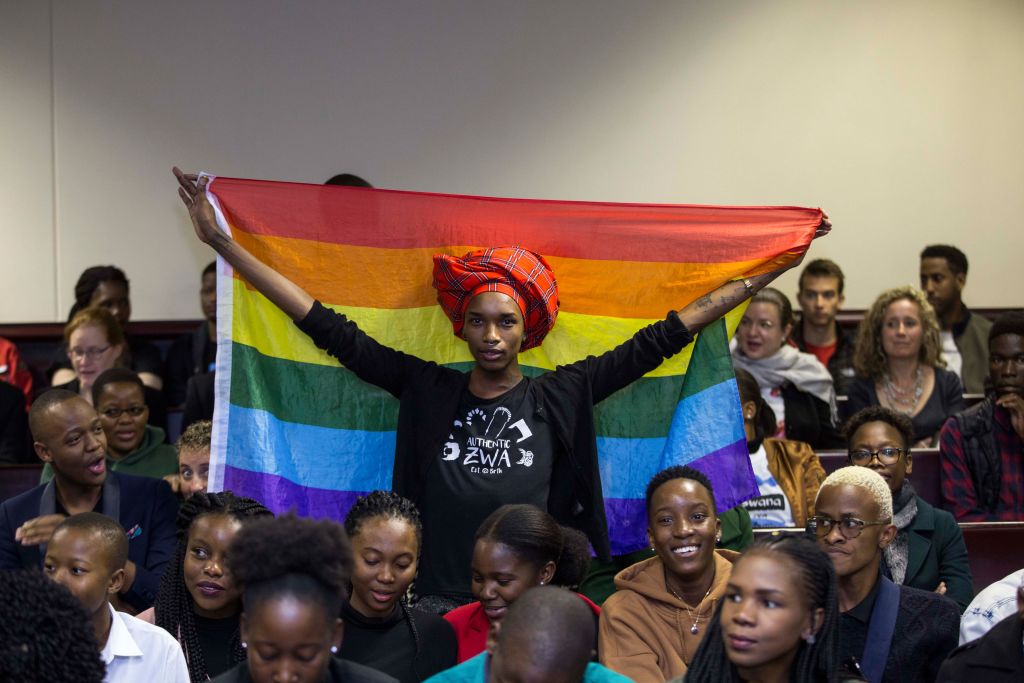
“The contemporary criminalisation of LGBT people is inextricably bound with colonial history. It’s right that where we campaign for change, this historical debt is acknowledged.”
Such laws have far-reaching impacts, even when they’re not strictly enforced. LGBTQ+ people across the world face discrimination in employment, education and housing, and punitive legal codes make them more vulnerable to abuse and violence that sometimes culminates in murder.
“Examples are plentiful of torture and other ill-treatment of detained LGBT people in criminalising countries,” Stewart says.
“Even where the law is not enforced, criminalisation leaves LGBT people subject to harassment and extortion by law enforcement and the public. The existence of these laws perpetuates stigma and prejudice.”
Julia Ehrt, executive director of ILGA World, says anti-LGBTQ+ laws ultimately stop queer communities from coming together, and many live their lives in secrecy.
“That has negative effects in regards to access to a social life. There’s a lot of violence in the streets and in families. Many LGBTQ+ people have to be in hiding.”
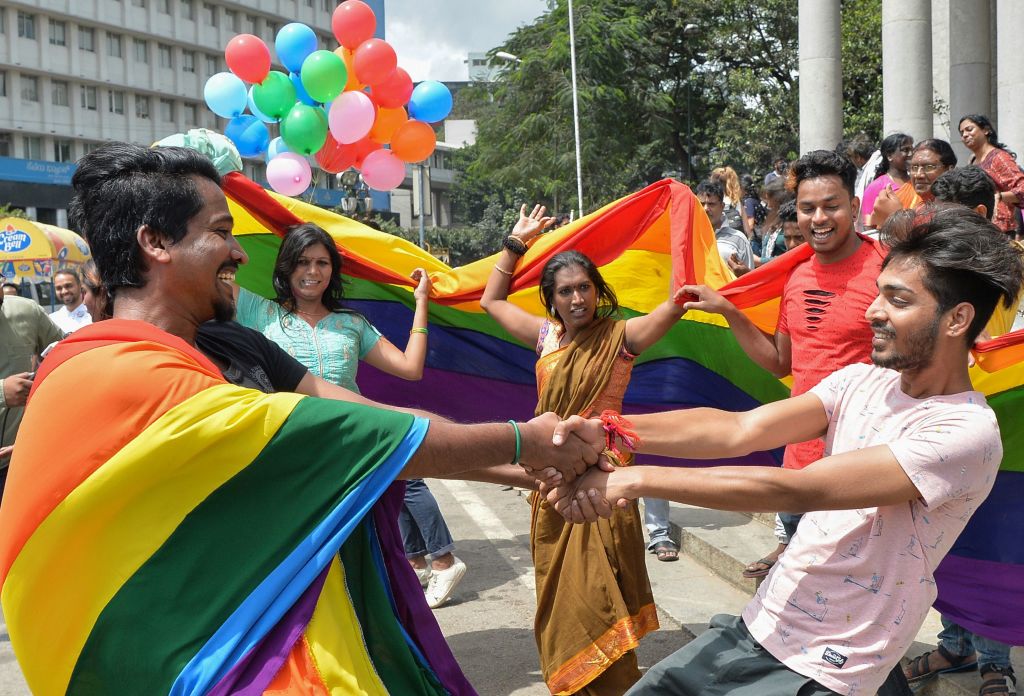
As far as Ehrt sees it, it’s vital that we talk about colonisation when talking about anti-LGBTQ+ laws – however, it’s also important “newer developments” aren’t ignored.
“There are a couple of countries that have re-criminalised in recent years. Indonesia has just passed a new criminal code which criminalises sexual intercourse outside of marriage, and because there’s no same-sex marriage by definition, all same-sex activity would be criminal. Whether it’s interpreted like that remains to be seen, but the fear and the implication is there.”
Still, former colonisers such as the UK have a responsibility to combat anti-gay laws they were responsible for creating – and they must do so in a way that doesn’t recreate the structures of colonialism.
“There’s an obligation from the UK to support local movements to advocate for themselves for decriminalisation in these countries,” Ehrt says.
The solution is for activists in western countries to “listen to communities on the ground” and to work with LGBTQ+ people in places where anti-LGBTQ+ laws are still in place.
“An effort needs to be made,” Ehrt says.
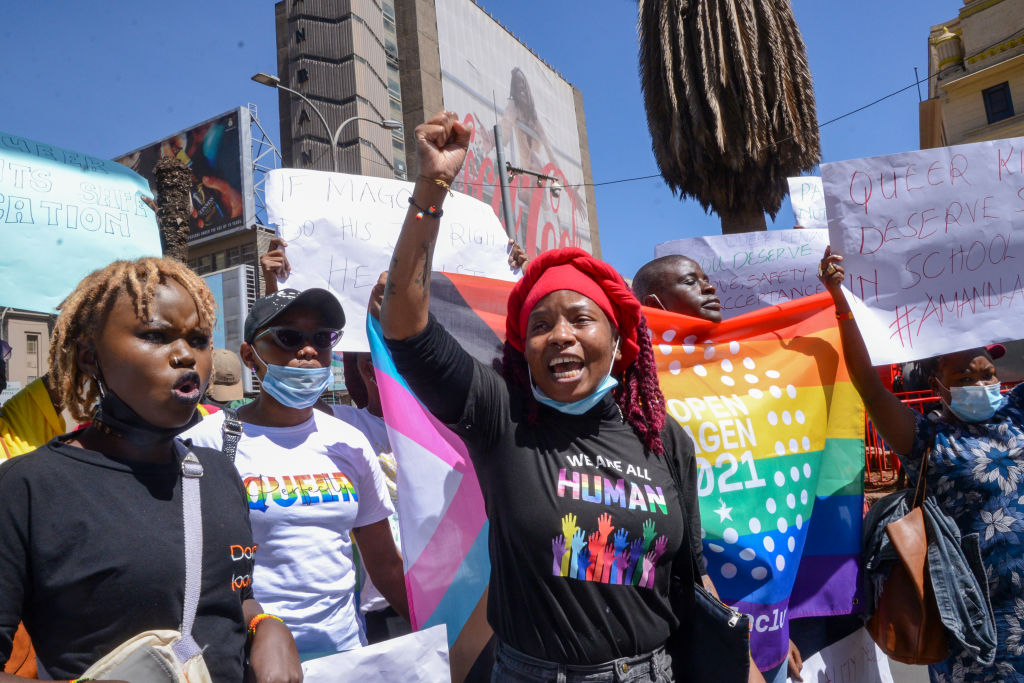
Stewart echoes that – he says the international community must play a role in striking down anti-LGBTQ+ laws, and that it must do all it can to support local activists in the work they’re doing.
“There is a vital role for the international community, whether that is through the work of international LGBT charities who provide much needed support to frontline LGBT charities and communities, or LGBT-friendly governments exercising diplomatic pressure, or through individuals informing themselves of the issue and donating to international LGBT causes where they can.
“These are all proven methods and ways of campaigning to change laws, hearts, and minds. This would not work however if cultural sensitivities weren’t taken into consideration.
“The international community must look to local LGBT organisations and communities for guidance in how to support their struggles against criminalisation and discrimination.
“Respect should be the bedrock on which change is sought.”
Here’s a full list of the 64 countries and territories where LGBTQ+ people are still criminalised
Below is a list of the 64 countries and territories that still criminalise LGBTQ+ identities, according to Human Dignity Trust.
These laws vary significantly in their severity. Some countries and territories still have anti-LGBTQ+ laws on the books, but they’re rarely enforced. Even in those places, queer people have to contend with discrimination that’s upheld at a state level.
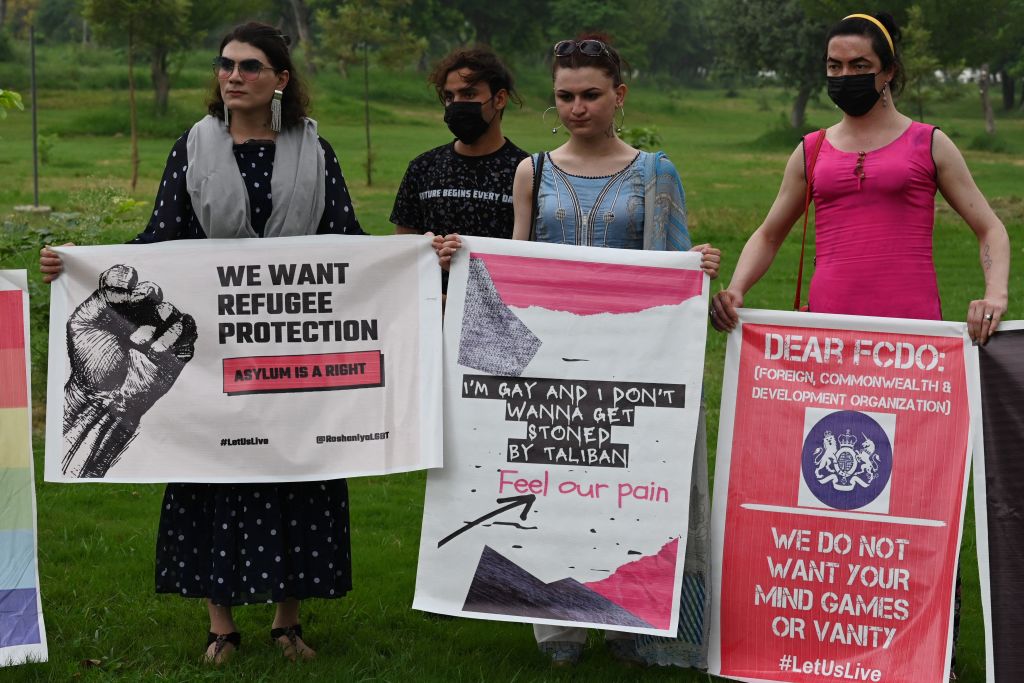
In other countries, anti-LGBTQ+ laws are regularly enforced, and queer people face persecution, prison sentences, and in some places even face the death penalty – all for the simple crime of being themselves.
Afghanistan: LGBTQ+ people can be sentenced to death. Same-sex sexual activity is illegal, and the Taliban takeover has resulted in queer people facing greater persecution.
Bangladesh: Same-sex sexual relations between men are illegal under this colonial-era law, with the maximum penalty life in prison. The law is rarely enforced but its existence, alongside other laws, can be used to harass LGBTQ+ people.
Brunei: Same-sex sexual activity is illegal for both men and women in Brunei under a colonial-era law. Men can face the death penalty while women can be caned or imprisoned, and trans people are also criminalised. A moratorium on the death penalty has been in place since 2019. There is no evidence of anti-gay laws being enforced in recent years.
Indonesia: Same-sex sexual activity is criminalised and an anti-pornography law is used to persecute LGBTQ+ people. A law passed in December 2022 outlaws all sex outside of marriage, which activists has warned will likely result in greater persecution for LGBTQ+ people as same-sex marriage is not legal.
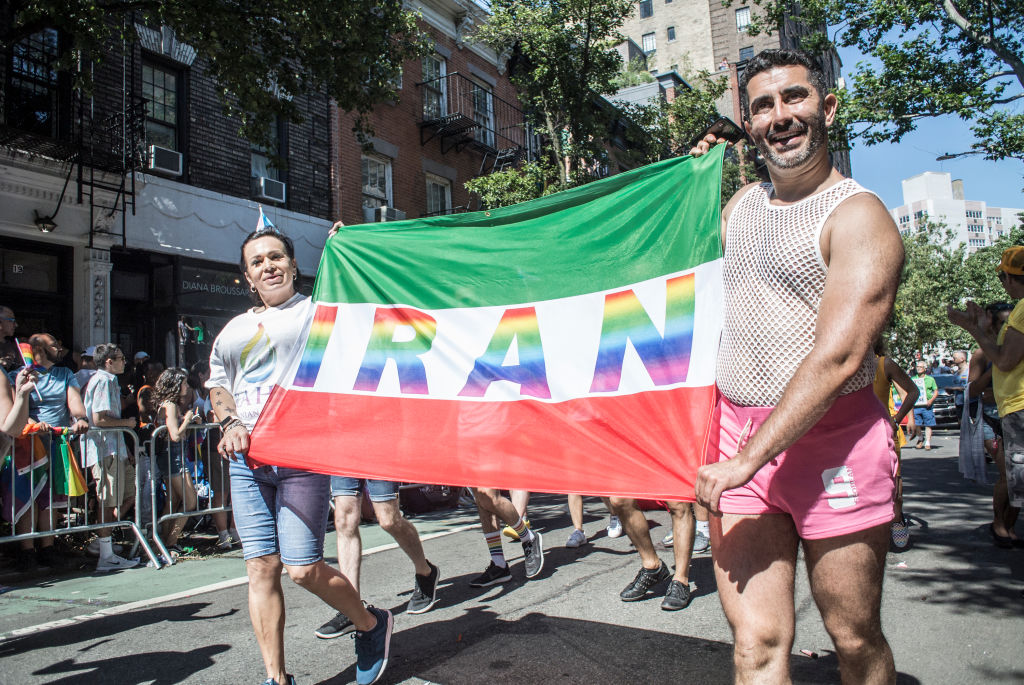
Iran: Same-sex sexual activity is illegal and is punishable by imprisonment or death.
Iraq: While same-sex sexual activity is not explicitly illegal in Iraq, offences such as “immodest acts” and “prostitution” – as well as Sharia law – mean that LGBTQ+ people still face persecution under the law.
Kuwait: Same-sex sexual activity between men is illegal under a colonial-era law and those convicted can be imprisoned for up to seven years.
Lebanon: Same-sex sexual activity between men is illegal under the Penal Code of 1943 which criminalises “sexual intercourse against nature”. Those found guilty can face up to one year in prison. Trans people also face persecution.
Malaysia: Same-sex sexual activity is illegal for both men and women under a colonial-era law, while trans people also face criminalisation. Maximum penalty is 20 years in prison and whipping.
Maldives: Same-sex sexual activity is illegal, with the maximum sentence set at eight years in prison and 100 lashes.
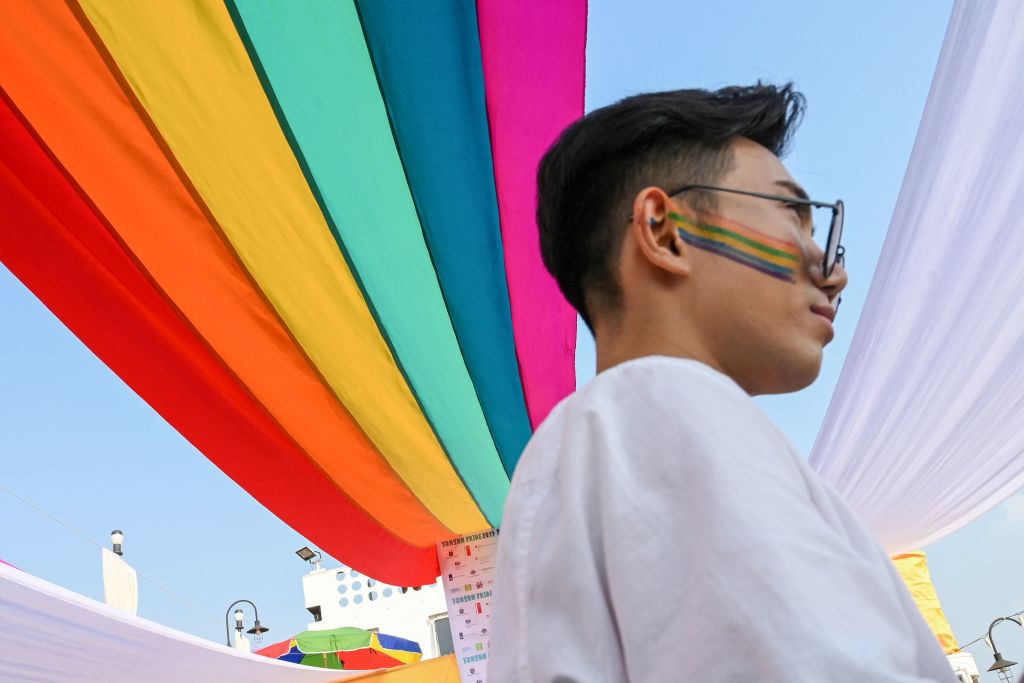
Myanmar: Sex between men is illegal and trans people also face criminalisation under a law inherited from Britain. The maximum penalty is 10 years in prison.
Oman: Sex between men and sex between women is illegal and trans people’s gender expression is criminalised. The maximum penalty is three years in prison. There is no evidence of anti-gay laws being enforced since 2009, but laws prohibiting crossdressing are thought to be enforced.
Pakistan: The penal code criminalises “carnal knowledge against the order of nature”, which means men can be persecuted for same-sex sexual activity. The maximum penalty is life in prison. The law was first put in place under British rule.
Palestine: Same-sex sexual activity is technically illegal in Gaza. The provision was introduced by Britain during its mandate over Palestine, although there’s little evidence that the law is enforced today.
Qatar: Same-sex sexual activity is illegal with a maximum of seven years in prison for those convicted. There is limited evidence of the law being enforced in recent years.
Saudi Arabia: Same-sex sexual activity is illegal for both men and women and trans people are also criminalised.
Sri Lanka: Same-sex sexual activity is illegal for both men and women and trans people also face criminalisation. The maximum punishment is 10 years in prison and a fine. The law was put in place under colonial rule.
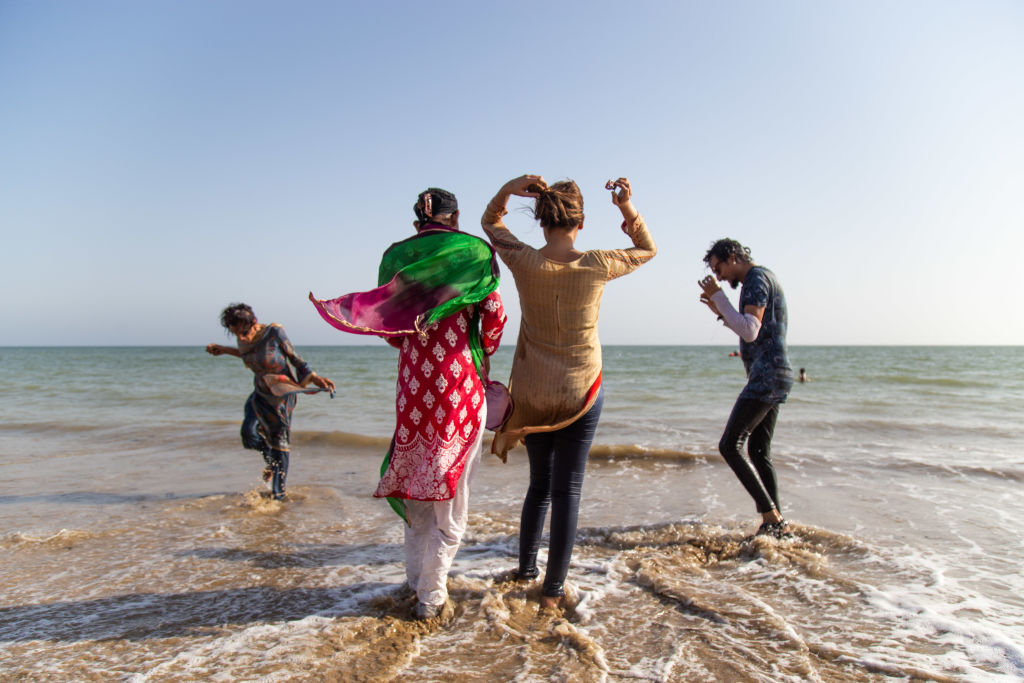
Syria: Same-sex relations are criminalised for both men and women with those convicted facing up to three years in prison.
Turkmenistan: Same-sex sexual activity between men is illegal, with the maximum penalty being two years in prison.
United Arab Emirates: All same-sex sexual activity is illegal and trans people are also criminalised. The maximum penalty is 14 years in prison, but the death penalty can also be applied under Sharia law.
Uzbekistan: Same-sex sexual activity between men is illegal, with the maximum penalty being three years in prison.
Yemen: Same-sex sexual activity is illegal with the maximum penalty listed as death by stoning. There’s little evidence of the law being enforced in recent years, however reports suggest gay men have been executed by militant groups.
Algeria: “Acts of homosexuality and “public indecency” are illegal, with a maximum of three years in prison for both men and women convicted.
Burundi: Same-sex sexual activity is illegal for both men and women. The maximum punishment is two years in prison.
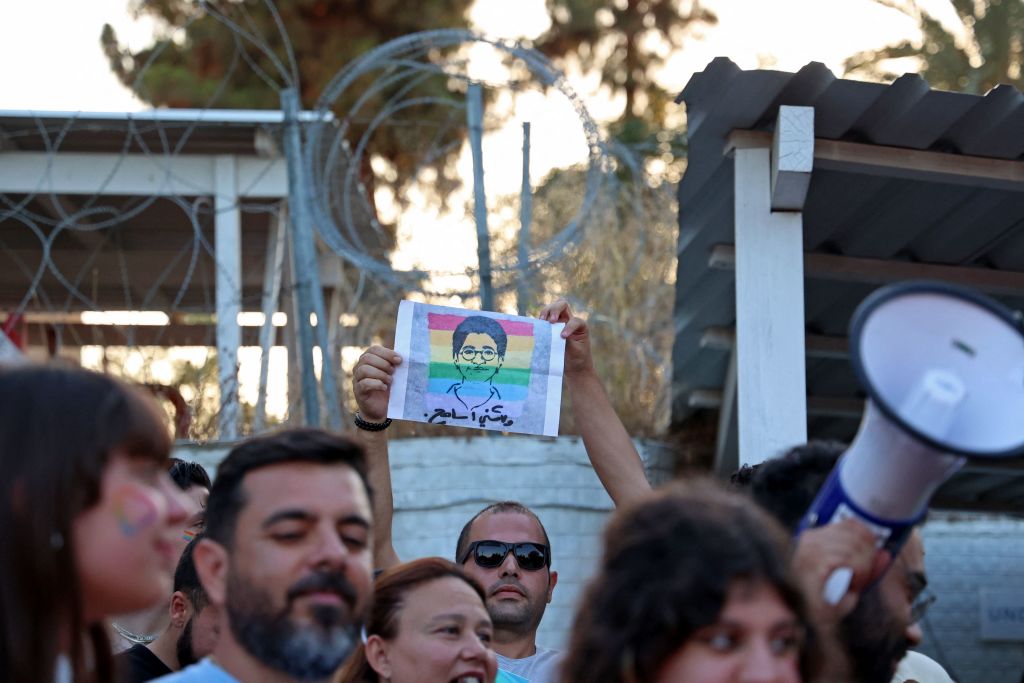
Cameroon: Both men and women can be sentenced to up to five years in prison if found to have engaged in same-sex sexual activity.
Chad: Same-sex sexual activity is illegal for both men and women. Those convicted face up to two years in prison and a fine.
Comoros: Up to five years in prison and a fine for both men and women convicted of engaging in “improper or unnatural acts”. The law is thought to be obsolete and there is no evidence it’s currently enforced.
Egypt: Same-sex sexual activity is illegal under the penal code, which criminalises “indecency”, “scandalous acts” and “debauchery”. Those convicted face up to three years in prison and a fine.
Eritrea: Same-sex sexual activity is illegal for both men and women. The maximum penalty is seven years in prison. There is limited evidence that the law has been enforced in recent years.
Eswatini: Sodomy is illegal, although there is no evidence the colonial-era law is enforced.
Ethiopia: Same-sex sexual activity is criminalised for both men and women, with the maximum penalty being one year in prison. It is one of the few African countries that enacted its own anti-gay laws – most others inherited those laws from Britain.
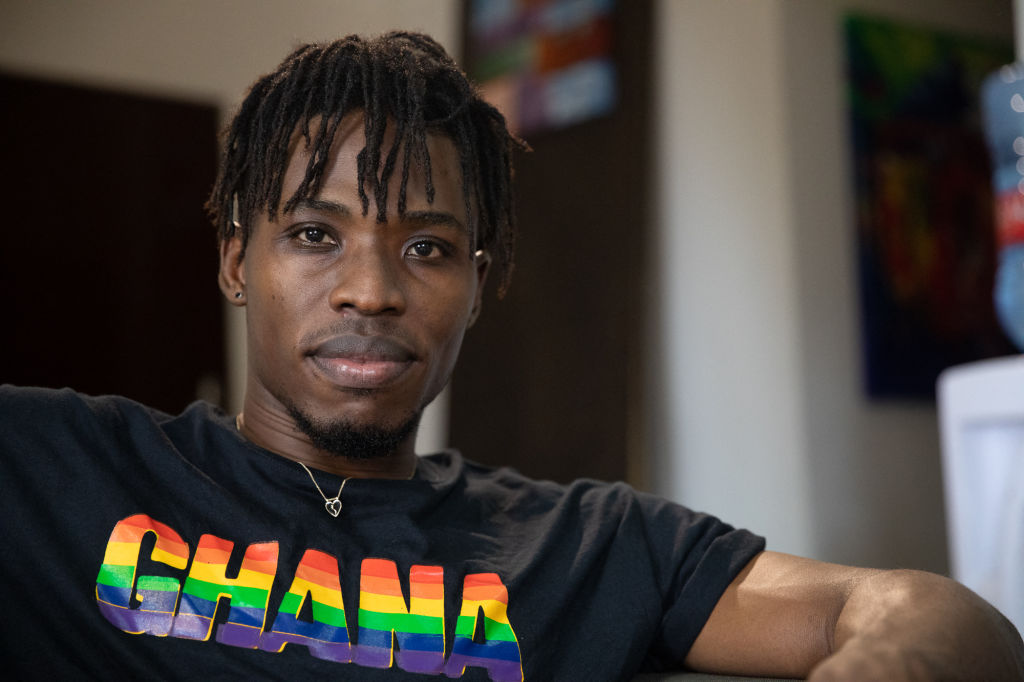
Ghana: Sex between men is criminalised, with the maximum penalty set at three years in prison. There is some evidence of LGBTQ+ people being arrested, but no evidence of convictions in recent years.
Guinea: Same-sex sexual activity for both men and women is illegal, with the penal code prohibiting “indecent acts or acts against nature”. The maximum punishment is up to three years in prison. There is little evidence of the law being enforced in recent years.
Kenya: Sex between men is criminalised, with the maximum penalty set at 14 years in prison. It is a colonial-era law imposed by the British. Reports suggest police are more likely to target gay men under “loitering” and “solicitation” laws.
Liberia: Same-sex sexual activity is illegal for both men and women, with the maximum penalty set at one year in prison.
Libya: Both men and women can face up to five years in prison for same-sex sexual activity.
Malawi: Same-sex sexual activity between men and women is criminalised, as is trans people’s gender expression. A moratorium on the law has been in place since 2014, meaning there have been no prosecutions since then.
Mauritania: Same-sex sexual activity is illegal for both men and women, with the maximum penalty set at death by stoning – however, there is a “de-facto” moratorium on its use, according to Human Dignity Trust.
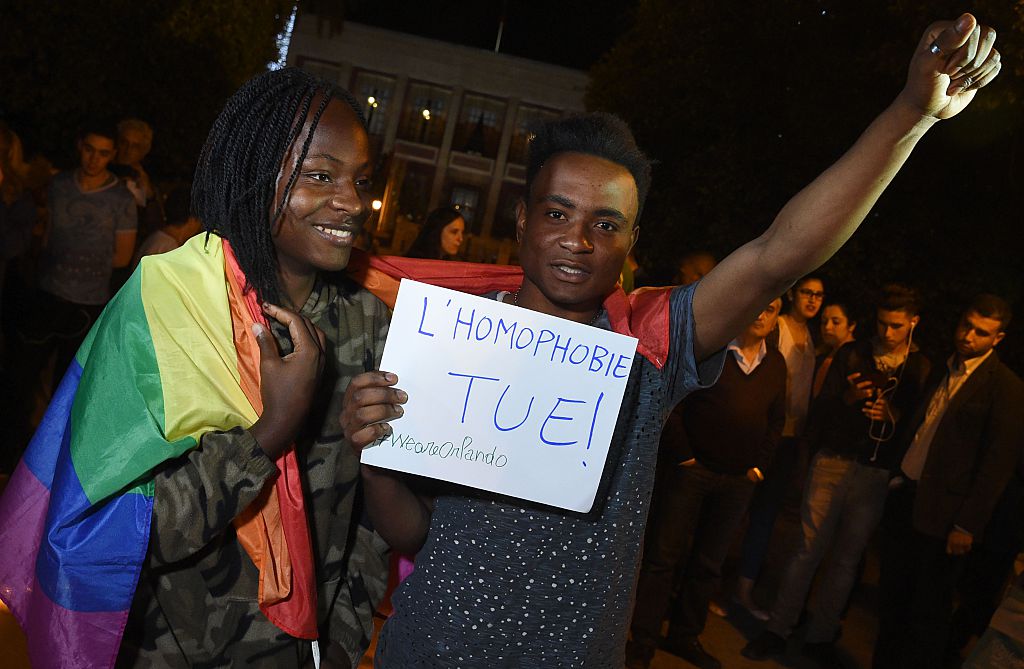
Morocco: Same-sex sexual activity is illegal for both men and women, with the maximum penalty three years in prison.
Namibia: Same-sex sexual activity between men is criminalised, however the sentence is unclear and there is no evidence the law has been enforced since the country gained independence from South Africa in 1990.
Nigeria: Same-sex sexual activity is illegal for both men and women, and trans gender expression is also criminalised. The maximum penalty at a national level is 14 years in prison, but at a state level, Sharia law can be imposed, which sets the punishment as death by stoning. The laws have their roots in British colonisation, but Nigeria strengthened its anti-LGBTQ+ laws further in 2013.
Senegal: Same-sex sexual activity is illegal between both men and women, with the maximum penalty being five yers in prison.
Sierra Leone: Sex between men is criminalised, with the maximum penalty set at life in prison. There is limited evidence that the law has been enforced in recent years.
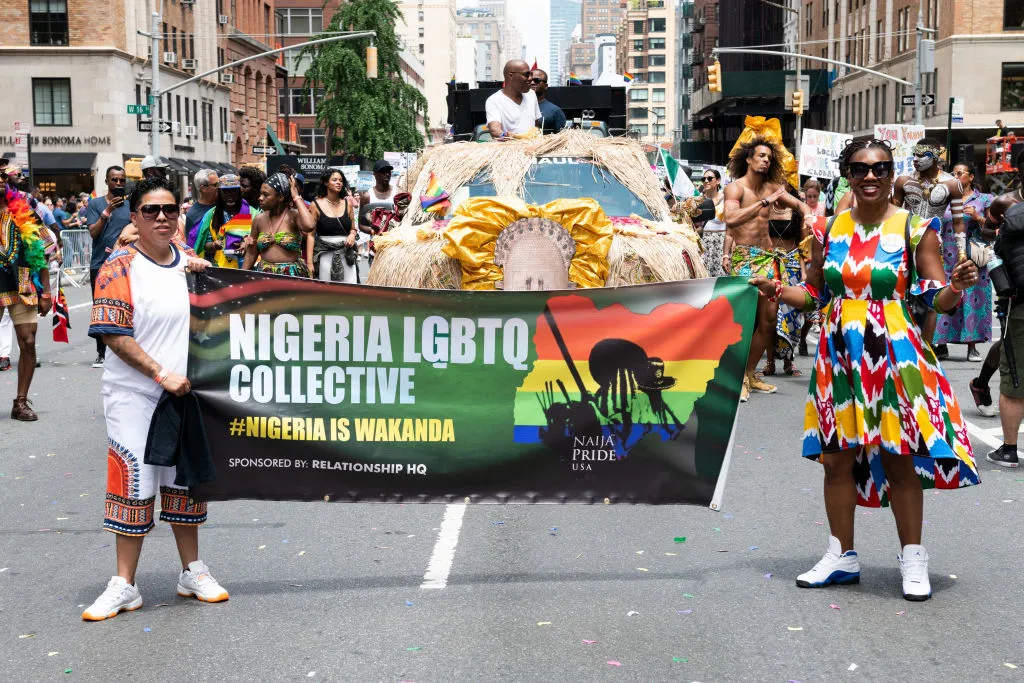
Somalia: Same-sex sexual activity is illegal for both men and women, with the penalty set at three years in prison – however, Sharia law can also be applied, under which the death penalty is possible. The law was inherited through British colonialism.
South Sudan: Sex between men and the gender expression of trans people are criminalised, with a maximum penalty of 14 years in prison and a fine. The law was inherited from Britain, and there is little evidence of it being enforced in recent years.
Sudan: Same-sex sexual activity is criminalised for both men and women, with the maximum penalty set at life in prison. The law was inherited from Britain.
Tanzania: Same-sex sexual activity is criminalised for both men and women, with the maximum penalty being life in prison. The law was first put in place under British rule.
The Gambia: Both men and women are criminalised under the law, with the maximum penalty being life in prison. The law was inherited from Britain under colonial rule.
Togo: Same-sex sexual activity is criminalised between men and between women. The maximum penalty is three years in prison and a fine. There is little evidence the law has been enforced in recent years.
Tunisia: Same-sex sexual activity is illegal for both men and women, with the penalty set at three years in prison.
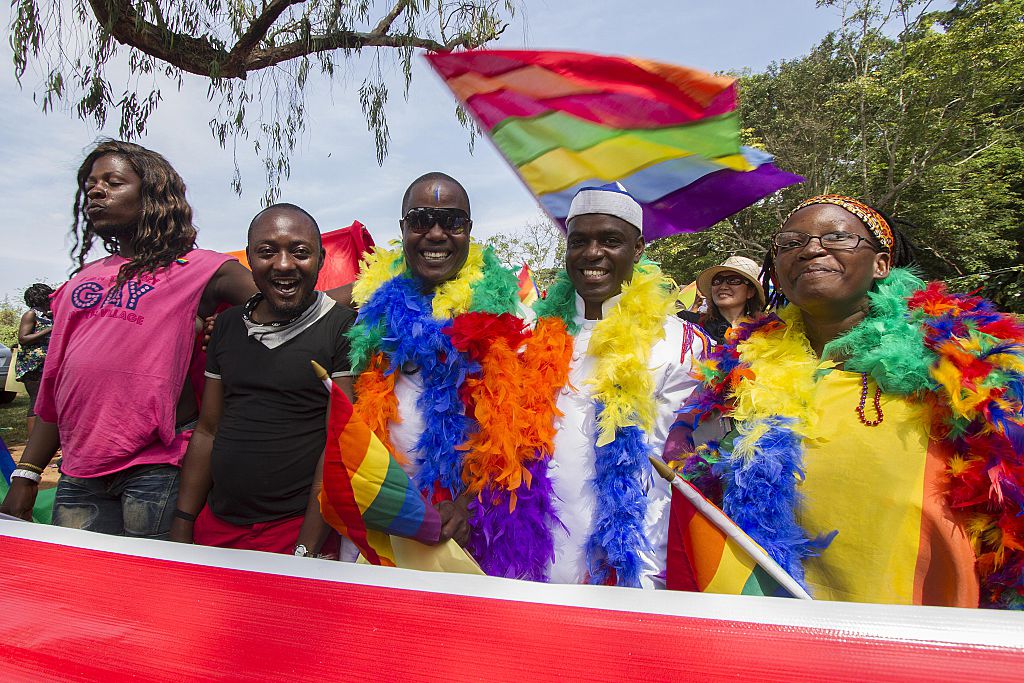
Uganda: Same-sex sexual activity is illegal for both men and women under a law that was inherited from the British. The maximum punishment is life in prison.
Zambia: Both men and women can face up to 14 years in prison for engaging in same-sex sexual activity. The law was inherited from Britain.
Zimbabwe: Sex between men is criminalised, with the maximum penalty set at one year in prison and a fine. Like many other African nations, it inherited “sodomy” laws from Britain through colonisation.
Grenada: Sex between men is criminalised, with the maximum penalty set at 10 years in prison. The law was inherited from Britain, and there is little evidence it’s been enforced in recent years.
Guyana: Sex between men is criminalised, and the maximum penalty is life in prison. The law was inherited from Britain and there is no evidence it’s been enforced in recent years – however, some reports suggest police use its existence to intimidate people.
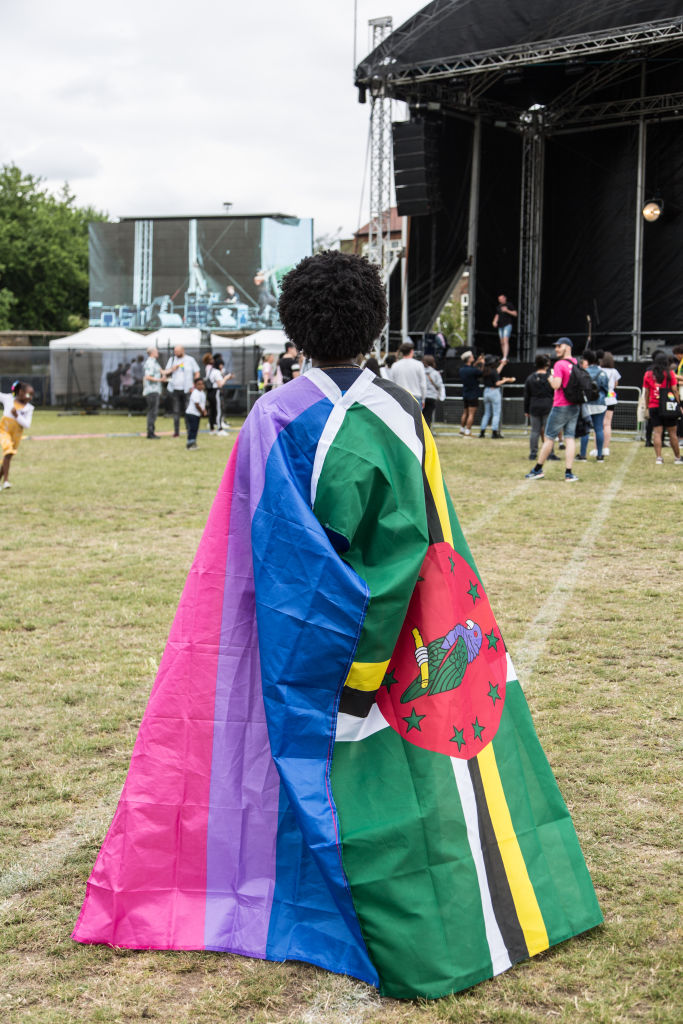
Jamaica: Same-sex sexual activity between men is criminalised, with the maximum sentence set at 10 years in prison with hard labour. The law was first put in place under British rule. While there’s little evidence the law has been enforced in recent years, some reports suggest it’s been used to extort LGBTQ+ people.
Saint Lucia: Same-sex sexual activity between both men and women is criminalised under a law inherited from British colonial rule. The maximum punishment is 10 years in prison, however there is no evidence it’s been enforced in recent years.
Saint Vincent and the Grenadines: This colonial era law criminalises same-sex sexual activity for both men and women, with 10 years in prison set as the maximum penalty. There is no evidence of he law being enforced in recent times.
Kiribati: This British colonial-era law prohibits same-sex sexual activity between men, with the maximum penalty set at 14 years in prison. There is no evidence the law has been enforced in recent times.
Papua New Guinea: Same-sex sexual activity between men is criminalised in a law that was inherited from Australia, which in turn came from Britain. The last known conviction under the law was 2015. The maximum penalty is 14 years in prison.
Samoa: Same-sex sexual relations between men are criminalised with the maximum sentence set at five years in prison. The law is inherited from New Zealand, which was based on British law. There is no evidence of the law being enforced.
Solomon Islands: The colonial-era law prohibits same-sex sexual activity for both men and women, with the maximum sentence set at 14 years in prison.
Tonga: This law was inherited from Britain while Tonga was a protectorate state. Same-sex sexual activity is criminalised for both men and women, with the maximum sentence set at 10 years in prison. There is no evidence of the law being enforced.
Tuvalu: Sex between men is criminalised, with up to 14 years in prison set as the maximum penalty. The law was inherited from Britain, and there’s no evidence of it being enforced today.
It’s disheartening how many countries make it illegal to be gay in 2024, but the good news is, since 2022 several countries have dropped off that list, including Barbados, Mauritius, the Cook Islands and Dominica, so we’re hopeful that we’ll be able to remove even more from this list in coming years.
How did this story make you feel?

